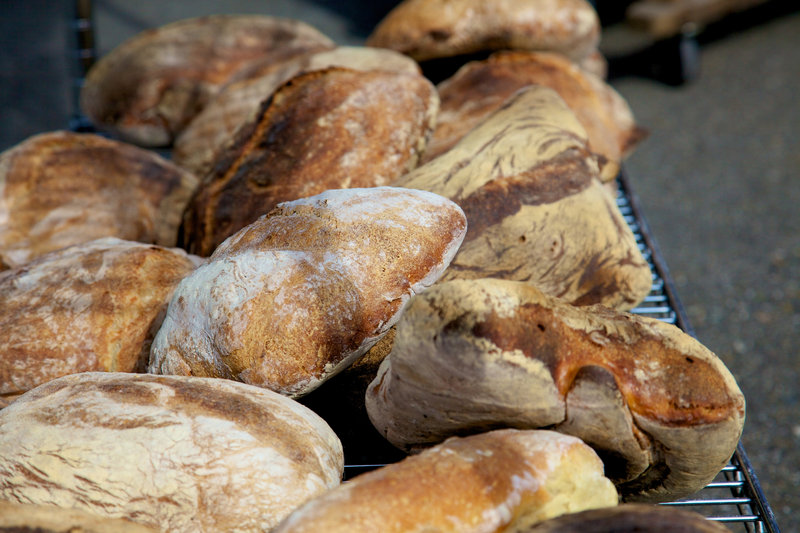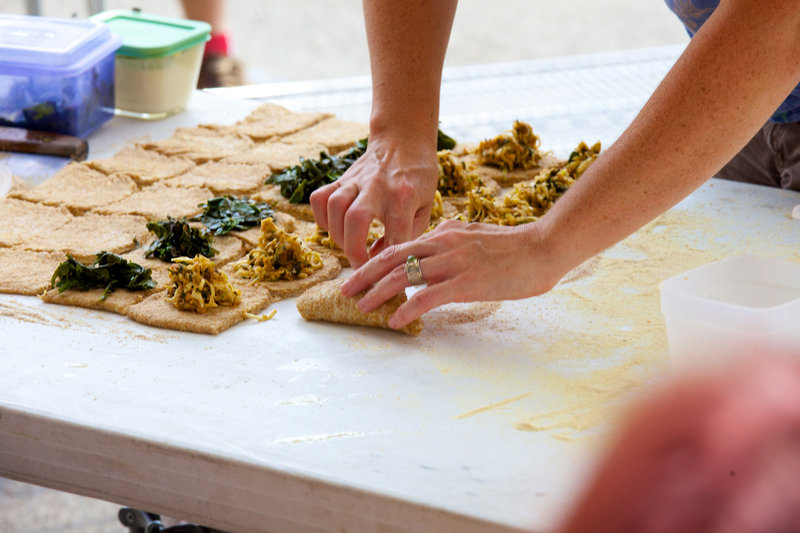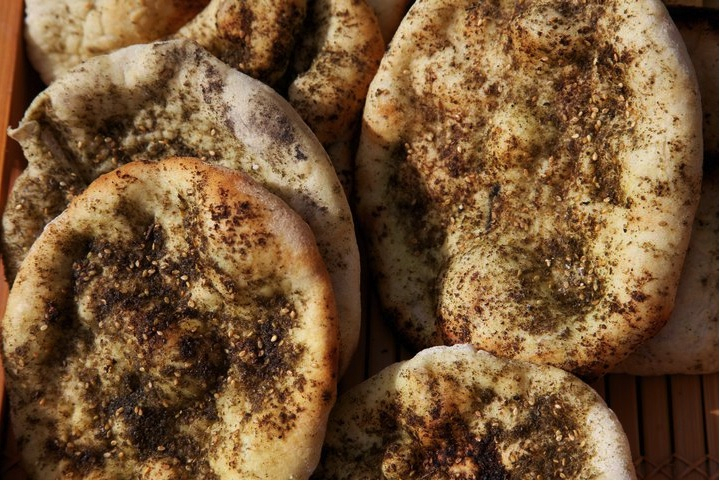Mary Burr and her husband Bob were so inspired by the first Kneading Conference in Skowhegan that they went home and grew three acres of barley on their sheep farm in Mercer.
They began converting their sheep operation into a vegetable farm, and started thinking about what was next.
“We’re both avid foodies, my husband and I, and we kept rehashing what was good for the (farmers) market, that needed improvement on, what was missing,” Burr said. “And we kept coming back to the theme of fresh pasta.”
So the couple researched pasta machines, traveled to Milan to see where they were made, and built a room at their Blue Ribbon Farm for the new business, which will sell pasta made from fresh wheat flour.
Now they’re just waiting for the state to do its final inspection before they start turning out bucatini, angel hair and penne pasta.
“We’re a couple of weeks away from actually being able to make it legally,” Burr said.
The pasta will be made with Maine wheat, and the fillings and other ingredients will come from local cheesemakers and their own farm.
The Burrs are just one example of how a small conference that brings bakers together with farmers can have an impact that reaches from small Maine communities all the way to the West Coast.
The goal of the Kneading Conference and Artisan Bread Fair, which will be held July 28-30, is to reinvigorate the business of growing, milling and selling local grains in Maine, once the breadbasket of New England. But “now we don’t even grow enough to supply ourselves,” said Michael Jubinsky of the Stone Turtle Baking and Cooking School in Lyman.
“There are a lot of people interested in re-establishing local grains because of biodiversity,” Jubinsky said, “and the quality of local grains, if they’re done right, is really phenomenal as far as flavor and baking profile.”
Now in its fifth year, the Kneading Conference has taught small-scale farmers and bakers what is possible, and shown them how to build the infrastructure needed to get the grain from field to table. It’s also opened up a whole new world – old world? – of flavor possibilities.
“It’s developing the knowledge of what’s available, offering the different kinds of wheats that people can use,” Jubinsky said, “and now growers are getting a sense that, ‘Hey, if I turn some of my fields that I just use for silage into wheat and I have it milled, I have a way of selling this.'”
Attendees range from New York lawyers who are just dabbling in bread on the side to serious professional bakers thinking of striking out on their own. Bakers have come from as far away as Hawaii.
Since beginning in 2007 with a handful of people doing demonstrations, the Maine conference has grown in both size and influence. Last year, the event moved to the Skowhegan Fairgrounds. The free Saturday bread fair, where the public can buy freshly made loaves and pizza, was launched three years ago. The first year, 750 people attended, and the bakers ran out of product.
Organizers planned to double the amount of bread for sale last year – but then 3,000 people showed up. This year, a restaurant equipment supplier has donated the use of a 60-quart mixer and other equipment so the bakers can handle the crowd.
NURTURING WHEAT FARMING
The past few years have also seen the beginnings of a federally funded project to develop organic wheat farming in Maine and Vermont.
During the past year alone, the Maine Grain Alliance – the group behind the Kneading Conference – has received several grants to push their projects forward.
The Sewall Foundation gave $92,000 to the alliance to renovate the commercial kitchen at the old Somerset County jail, which is being converted into a grist mill. The plan is to make the kitchen available for community events and fundraisers.
“The ability to have access to a commercial kitchen is not just going to benefit the Maine Grain Alliance,” said Amber Lambke, executive director of the alliance and co-founder of the grist mill, “but it’s going to be good for the farmers who might want to use that kitchen for food processing and value-added products. It’s going to be good for our health agencies in town who want to do more low-income education around cooking.”
That same grant also funded a new mobile bake oven and a part-time kitchen manager. The bake oven will be something bakers can take to schools, for example, to teach children about local grains and how they’re being used in artisanal breads.
A $33,500 grant from the Finance Authority of Maine will help fund the mechanical renovations needed to get the flour-milling operations at the grist mill up and running by this fall.
A much larger grant of $250,000 from the Sewall Foundation will be parceled out through the Somerset Economic Development Corp. to farmers and food processors who want to be part of the developing “food hub” at the grist mill.
The farmers market already meets at the mill twice a week, and farmers are developing a new multi-farm CSA (community-supported agriculture) program to try to make local food more widely available.
“It will begin with fruits and vegetables, and then it will be extending to meats and pasta,” Burr said. “There’s a market that’s really emerging for the farmers. It’s also the health of the community and bringing the community together. Bread is, like, not bread alone, as they say.”
PROJECTS AROUND U.S.
This year, Kneading Conference attendees will also learn more about what’s going on in the rest of the country at a Thursday-evening event dubbed “Naan Sense.” Inspired by TED.com, presenters will be given seven or eight minutes to talk about the grain projects they have in development.
“They may be teaching high school students how to make bread,” said Wendy Hebb, one of the organizers of the Maine conference. “It’s a show and tell, basically. I think people are inspired by what works. Some of these ideas are new and fresh. Some of them are reaching back into the legacy of grain farming.”
The influence of the Kneading Conference has even spread to the other coast. Sustainable agriculture experts from the Pacific Northwest who have been attending and presenting at the Maine conference decided to start their own this year.
“They have the farmers, they have some millers, they have some bakers, but they’re not talking with one another,” said Wendy Hebb, one of the organizers of the Maine conference.
The first Kneading Conference West will take place in September in Mount Vernon, Wash.
“I think there’s a real momentum now that’s taking hold,” said Alison Pray, one of the owners of Standard Baking Co. in Portland, who will be participating in a conference panel called “The Business of Baking.” “In terms of growing our own grains, I think with all these grants, and all this interest, Maine is really on the cutting edge.”
Staff Writer Meredith Goad can be contacted at 791-6332 or at: mgoad@pressherald.com
Send questions/comments to the editors.






Success. Please wait for the page to reload. If the page does not reload within 5 seconds, please refresh the page.
Enter your email and password to access comments.
Hi, to comment on stories you must . This profile is in addition to your subscription and website login.
Already have a commenting profile? .
Invalid username/password.
Please check your email to confirm and complete your registration.
Only subscribers are eligible to post comments. Please subscribe or login first for digital access. Here’s why.
Use the form below to reset your password. When you've submitted your account email, we will send an email with a reset code.